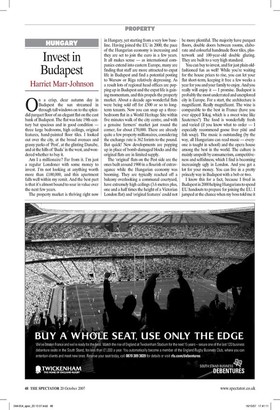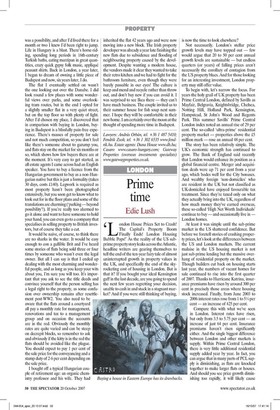Invest in Budapest
Harriet Marr-Johnson n a crisp, clear autumn day in Budapest the sun streamed in through tall windows on to the splendid parquet floor of an elegant flat on the east bank of Budapest. The flat was late 19th-century but spacious and in good condition — three large bedrooms, high ceilings, original features, hand-painted floor tiles. I looked out over the city, at the broad avenues and grassy parks of 'Pest', at the glinting Danube, and at the hills of 'Buda' in the west, and wondered whether to buy it.
Am I a millionaire? Far from it. I'm just a regular Londoner with some money to invest. I'm not looking at anything worth more than £100,000, and this apartment falls well within my remit. And the best part is that it's almost bound to soar in value over the next few years.
The property market is thriving right now in Hungary, yet starting from a very low baseline. Having joined the EU in 2000, the pace of the Hungarian economy is increasing and they are set to join the euro in a few years. It all makes sense — as international companies extend into eastern Europe, many are finding that staff are more attracted to expat life in Budapest and find a potential posting to Warsaw or Riga relatively depressing. As a result lots of regional head offices are popping up in Budapest and the expat life is gaining momentum, and this propels the property market. About a decade ago wonderful flats were being sold off for £500 or so to longterm tenants. Now you can snap up a threebedroom flat in a World Heritage Site within five minutes walk of the city centre, and with a genuine farmers' market just round the comer, for about £70,000. There are already quite a few property millionaires, considering the exchange rate is 362 forints to the pound. But quick! New developments are popping up in place of bomb-damaged blocks and the original flats are in limited supply.
The 'original' flats on the Pest side are the ones built around 1900 in a flourish of extravagance while the Hungarian economy was booming. They are typically reached off a balcony overlooking a communal courtyard, have extremely high ceilings (3.6 metres plus, one and a half times the height of a Victorian London flat) and 'original features' could not be more plentiful. The majority have parquet floors, double doors between rooms, elaborate and colourful handmade floor tiles, plasterwork and 100-year-old double glazing. They are built to a very high standard.
You can buy to invest, and for just plain oldfashioned fun as well! While you're waiting for the house prices to rise, you can let your flat short-term, keeping it free a few weeks a year for you and your family to enjoy. And you really will enjoy it — I promise. Budapest is probably the most underrated and unexplored city in Europe. For a start, the architecture is magnificent. Really magnificent. The wine is comparable to the best in France (have you ever sipped Tokaj, which is a sweet wine like Sauternes?) The food is wonderfully fresh and varied (if you know what to order — I especially recommend goose liver pate and fish soup). The music is outstanding (by the way, all Hungarians can read music — everyone is taught in school) and the opera house among the best in the world. The culture is mainly unspoilt by consumerism, competitiveness and selfishness, which I find is becoming increasingly ugly in London. And you get a lot for your money. You can live in a pretty princely way in Budapest with a bob or two.
I know this for a fact, because I lived in Budapest in 2000 helping Hungarians to spend EU handouts to prepare for joining the EU. I jumped at the chance when my boss told me it was a possibility, and after I'd lived there for a month or two I knew I'd been right to jump. Life in Hungary is a blast. There's horse-riding, spending long periods in 16th-century Turkish baths, eating marzipan in great quantities, crazy quick gypsy folk music, appliqué peasant shirts. Back in London, a year later, I began to dream of owning a little piece of Budapest and now, six years later, I do.
The flat I eventually settled on wasn't the one looking out over the Danube. I did look round a few places with some wonderful views over parks, and some overlooking tram routes, but in the end I opted for a slightly smaller flat in a very quiet street, but on the top floor so with plenty of light. After I'd chosen my place, I discovered that in comparison with buying in London, buying in Budapest is a blissfully pain-free experience. There's masses of property for sale and not much competition, so you don't feel like there's someone about to gazump you, and flats stay on the market for six months or so, which shows how few buyers there are at the moment. It's very easy to get started, as all estate agents I came across had an English speaker. You have to buy a licence from the Hungarian government to buy as a non-Hungarian native but this is just a formality (takes 30 days, costs £140). Legwork is required as most property hasn't been photographed extensively, but you soon get to know what to look out for in the floor plans and some of the translations are charming (parking —beyond possibility'!). If you're really too alarmed to go it alone and want to have someone to hold your hand, you can even go to a company that specialises in selling property to British investors, but of course they take a cut.
It would be naive, of course, to think there are no sharks in the water. It would be easy enough to con a gullible Brit and I've heard some stories of flats being sold three or four times by someone who wasn't even the legal owner. But all I can say is that I ended up dealing with the most charming and wonderful people, and as long as you keep your wits about you, I'm sure you will too. It's important that you ask to see the title deeds and convince yourself that the person selling has a legal right to the property, as some confusion over ownership remains after resettlement post-WW2. You also need to be aware that the flats around a courtyard all pay a monthly rate for management, renovations and tax to a management group and on occasion the accounts are in the red. Obviously the monthly rates are quite varied and can be steep on decrepit blocks, so remember to ask and obviously if the kitty is in the red the flats should be avoided like the plague. You should expect to pay 1 per cent of the sale price for the conveyancing and a stamp duty of 2-6 per cent depending on the sale price.
I bought off a typical Hungarian couple of retirement age: an organic chemistry professor and his wife. They had inherited the flat 42 years ago and were now moving into a new block. The Irish property developer was already a year late finishing the new flats due to subsidence and flooding of neighbouring property caused by the development. Despite wanting a modern house, the vendors made it clear they wanted to take their retro kitchen and we had to fight for the bathroom furniture, even though they were barely passable in our eyes! The culture is keep and mend and recycle rather than throw out, and don't buy new if you can avoid it. I was surprised to see Ikea there — they can't have much business. The couple invited us to their summer house for fish soup next summer. I hope they will be comfortable in their new home. I am certainly over the moon at the thought of spending more time in Budapest.
Lawyers: Andrcis Orbcin, tel. +36 1 487 5410; Fendrik Zsolt, tel. +36 1 302 6535 www.fendrik.hu. Estate agents: Duna House www.dh.hu; Casaro www.casaro-hungcny.corn; Gateway Properties (overseas investments specialists) www.gatewaypropenies.co.uk.








































































 Previous page
Previous page